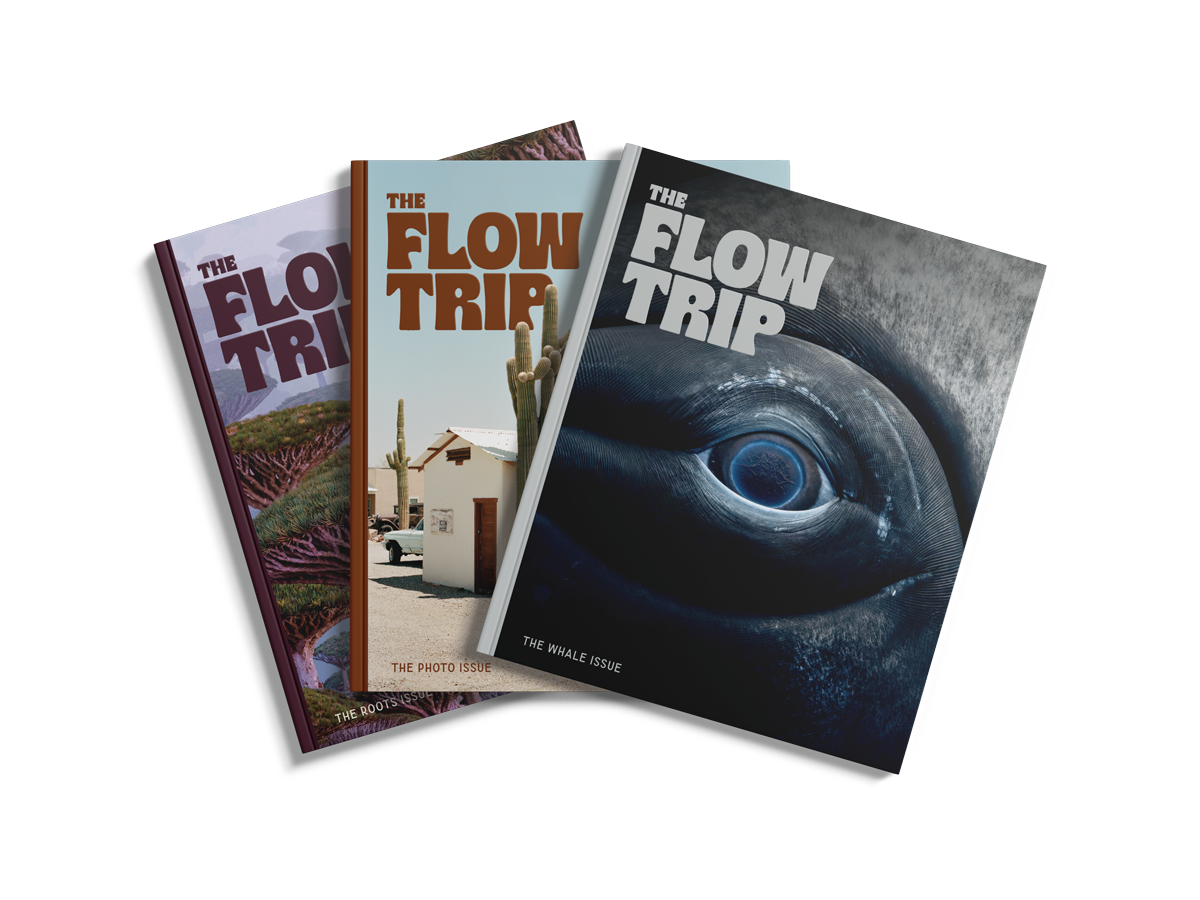The Sky's No Limit
The Flow TripTraveling to space with Kellie Gerardi
We’ve all been asked, “What do you want to be when you grow up?” And at that point, we probably said things like the president of the United States, a doctor, or an astronaut. And looking back now a lot of us are not, in fact, the president, and maybe we didn’t end up going to eight-plus years of med school. But for Kellie Gerardi, her answer was astronaut, and damn if she achieved it. As one of fewer than 100 women to travel to space, Kellie achieved her childhood dream, and through that has helped to encourage other women and girls that they can do the same thing. We were fortunate enough to catch up with Kellie while she was Earthside to talk things out of this world.
Flow Trip: When you blast off, shoot through the atmosphere, enter space, look out the window of the spacecraft, and look back to see our little blue planet, how does that alter your paradigm of life on Earth?
Kellie Gerardi: I can't understate how profoundly emotional the experience of looking down at our home planet is. And that emotional saturation has continued ever since. It's truly a cognitive shift in perspective, and there's actually a name for the phenomenon — it's called the overview effect. For me, this resulted in a permanent sense of awe and appreciation for our universe and a renewed affection and tenderness towards my fellow humans. It's a sense that we're all in this together and a part of something so much larger than ourselves.
I felt incredibly well-trained on the operational and science side and knew exactly what to expect during my spaceflight, but in hindsight, I realized nothing could have truly prepared me for seeing planet Earth with my own eyes. It was just jaw-dropping awe. It was mind-bending and profound. If I’m honest, I’m still processing it. I don’t know that I’ll ever quite find the words to do it justice, so I’m so grateful I’ll get to have a second look on my next mission. It was an intensely emotional experience.
 Photo by Virgin Galactic
Photo by Virgin Galactic
FT: How does it feel to achieve your goal of traveling to space? How about helping to continue shattering that glass ceiling?
KG: Surprisingly, it’s a bit difficult for me to describe. It’s like a feeling of deep peace and personal fulfillment. At the risk of sounding dramatic, achieving my dream felt like a massive weight was lifted from my shoulders — almost like a sense of relief that I was able to do the one thing I felt like I was put on this Earth to do.
FT: Why is children’s education about space so important to you? What’s the biggest thing you want these kids to take away from your children’s books?
KG: Luna Muna started as a bedtime story I told my daughter. When she was a baby, I also noticed a market gap for space-themed books that centered girls as the main characters. I wrote the book series in an effort to fill that gap. The sparkly future astronaut Luna Muna with her glittery space helmet helped create some visual representation in the minds of young girls to show that space and sparkle and glitter and science can all go together. I've been so humbled by the reception. Luna Muna has been flown to space and read from the International Space Station and was also selected by the president and the first lady to be read at the White House Easter Egg Roll, which was a tremendous honor.
" At the end of the day, I’m a mother, a wife, a daughter, and a friend… who happens to be a researcher and an astronaut, too."
FT: What’s next for space travel? What do you personally hope future generations achieve in terms of space exploration one day?
KG: I believe space is humanity’s shared past and our shared future. We’re standing on the doorstep of a new golden age of spaceflight. We’ve taken our first small steps, but our next giant leaps will require the contributions of artists, engineers, and everyone in between. One of my favorite quotes sums up my sentiment perfectly: “There are no passengers on spaceship Earth; we are all crew.” I hope our next chapter will see a dramatic preservation of our home planet and an inspirational expansion of humanity’s footprint in the solar system.
FT: There are so many things to see in space. Explain how being in the realm of these celestial bodies and beings feels in comparison to only seeing them via images before you traveled to space.
KG: We’ve all seen pictures of the Earth from space, but the difference for me was truly experiencing it as a planet. Looking down at our shared home planet, I experienced an intense cognitive dissonance of feeling both a part of it and slightly outside of it. And I had an intensely emotional reflection of realizing that I wasn’t currently on the same planet as my baby.

FT: When we think of traveling to space, we think of the word transcendent — launching into the cosmos. Can you explain how this feels to you?
KG: The word euphoric comes to mind. It truly felt like I was on an elevator straight to the stars — albeit going Mach 3 on a rocket-powered elevator. When I returned, we had a mandatory medical debrief, and the only symptom I had to report was mild cheek soreness from grinning through the high g-forces of the launch phase. And then suddenly the euphoria shifts to serenity and awe, the deafening roar of the rocket motor gives way to the silence and stillness of space and the transcendence of weightlessness. It’s such a profound experience.
FT: How does it feel knowing you are helping to bridge that gap between the general public and the minds of astronauts, scientists, engineers, and more?
KG: I love being able to provide a bit of inspiration for people who might not have seen themselves visibly represented in these roles or even imagined them as a possibility. It’s also a reminder of how much can change in a single generation. When my mom was born, human beings hadn't yet been to space. And when she was growing up, women weren't eligible. Just one generation later, she watched her daughter reach the stars and is watching her granddaughter take it for granted. It's a paradigm shift and I'm filled with excitement to see the next generation go even further. Fewer than 100 women in history had ever been to space when I flew, but the limiter to human spaceflight has always been access and not aptitude, and that's changing. I'm excited to see those numbers soar.
FT: One thing you hope your daughter learns from your overall outlook on life?
KG: The most rewarding aspect of my own journey has definitely been experiencing it through the eyes of my now 7-year-old daughter, Delta. I was only the 90th woman in history to fly to space, but in Delta’s mind, that’s just another thing girls do. She’s growing up knowing that not even the sky is the limit on her dreams. It’s also been a powerful reminder of how much can change in a single generation.
"I believe space is humanity’s shared past and our shared future."
FT: How do you constantly find ways to make space relevant no matter the audience?
KG: I think my content resonates because it’s about something much more universal than space travel itself — it’s about dreaming bold dreams, embracing your multitudes, and cultivating the self-confidence to reach for the stars, no matter what they happen to be in your life. I also share so many personal aspects of my life, like my IVF journey. At the end of the day, I’m a mother, a wife, a daughter, and a friend… who happens to be a researcher and an astronaut, too.
FT: What would you say is your non-technical, but solely personal pre-spaceflight routine?
KG: For me, I like to wake up incredibly early so that I can take a leisurely time getting ready, meditating, centering my thoughts, and feeling the ground beneath my feet. I love listening to music and taking time to really reflect on the profundity of the day that I’m about to embark on, and then I love to spend a few minutes individually with family members, like my daughter, my husband, and my parents.
 Photo by Virgin Galactic
Photo by Virgin Galactic
FT: What is the biggest misconception about space travel?
KG: That it’s terrifying to stare into the endless expanse of space. I’ve never felt more at peace or a stronger sense of hope than I did when I looked out into our infinite universe.
Legacies in Depth
The Flow TripWhat the Water Gave Me
The Flow TripSubscribe to The Flow Trip
- Choosing a selection results in a full page refresh.
- Opens in a new window.



